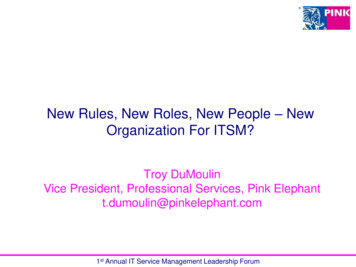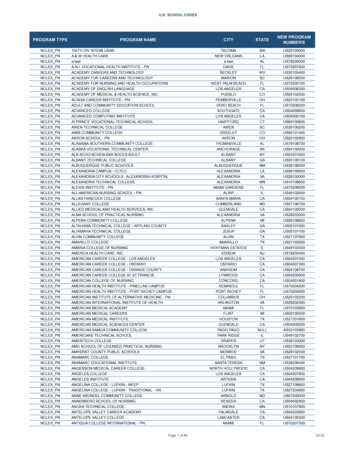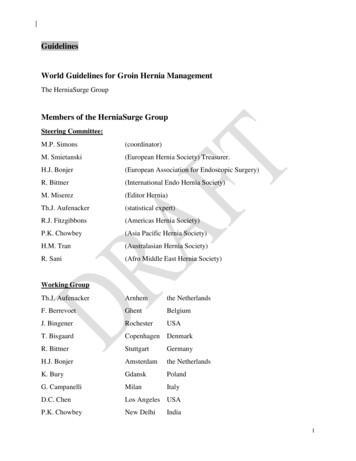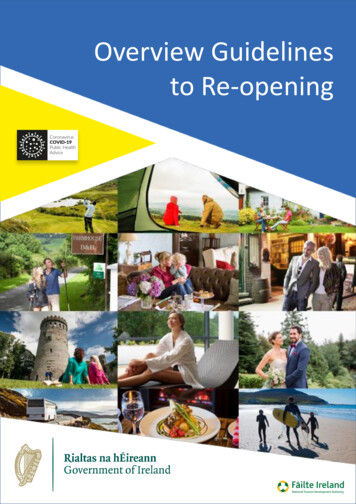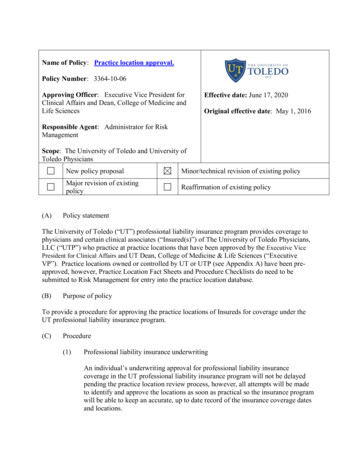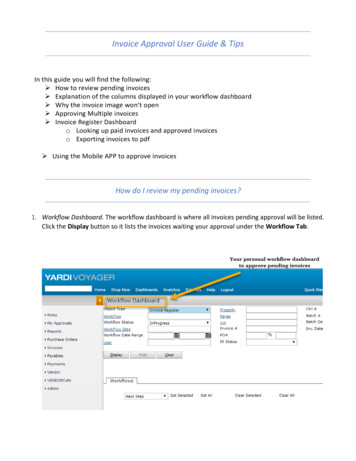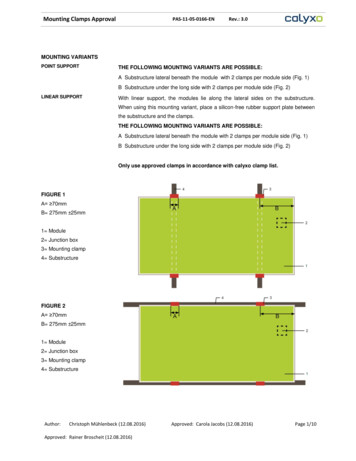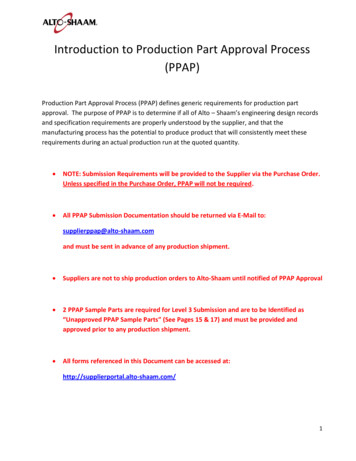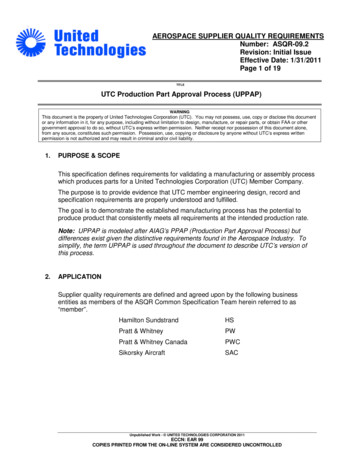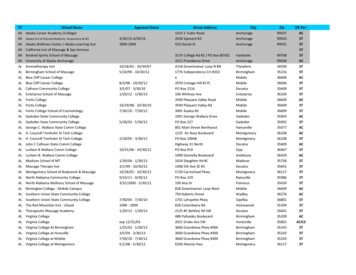
Transcription
ACAP2-18-16Agenda Item 9aName of InstitutionThe CitadelName of Program (include concentrations, options, and tracks)Bachelor of Science in Nursing (BSN)Program DesignationAssociate’s DegreeMaster’s DegreeBachelor’s Degree: 4 YearSpecialistBachelor’s Degree: 5 YearDoctoral Degree: Research/Scholarship (e.g., Ph.D. and DMA)Doctoral Degree: Professional Practice (e.g., Ed.D., D.N.P., J.D., Pharm.D., and M.D.)Does the program qualify for supplemental Palmetto Fellows and LIFE Scholarship awards?YesNoProposed Date of ImplementationJanuary 2017CIP Code51.3801Delivery Site(s)Courses offered on-site, with clinical rotations at hospitals/clinicsDelivery ModeTraditional/face-to-face*Distance Education*select if less than 50% online100% onlineBlended (more than 50% online)Other distance educationProgram Contact Information (name, title, telephone number, and email address)Dr. Lok C. Lew Yan VoonDean of Science and tional Approvals and Dates of ApprovalInstitutional Approval: January 14, 2016Academic Board: December 15, 2015Department of Health, Exercise, and Sports Science: December 1, 20151
ACAP2-18-16Agenda Item 9aBackground InformationState the nature and purpose of the proposed program, including target audience and centralityto institutional mission. (1500 characters)This proposal is for a traditional four-year Bachelors in Nursing Science (BSN) program at apublic institution in Charleston. No such program currently exists. In addition to a daytimeprogram with the Corps of Cadets, an evening program will be established offering a BSNdegree completion for students who have completed the general education requirements.With this program, the citizens of South Carolina and beyond will have the opportunity to earna BSN at an institution that offers a distinctive education. Our proposals have receivedunanimous approval for further development from the SC Board of Nursing.The daytime program would benefit from the strong core curriculum at The Citadel. It will beoffered within the SC Corps of Cadets (SCCC), ROTC students, officer candidates, andVeteran students. Supporting the Nurse Corps would be an important component of thisprogram as the federal service academies do not offer nursing. The evening program wouldserve several populations: Charleston area residents who have a daytime job and/or studentswith an Associate’s in Science degree from Trident Technical College (TTC) and othercommunity colleges seeking a BSN.The BSN program would satisfy The Citadel’s strategic plan, Leadership Excellence andAcademic Distinction (LEAD) 2018 Objective 2 (academic programs of distinction), andObjective 8 (provide outreach to the region and serve as a resource in its economicdevelopment) and will increase our partnerships with the community. It will also increase ourability to gender diversify the SCCC; currently at about 8% female. The program is expectedto be attractive to Veterans and this will benefit from our strong interaction with the VAMedical Center in Charleston. Finally, together with the proposed evening program, it willdiversify and increase our tuition stream.List the program objectives. (2000 characters)The program has the following objectives:1. Offer state supported traditional and completion BSN programs for SC residents in theCharleston area;2. Increase the number of BSN prepared nurses in the Charleston area consistent with theInstitute of Medicine recommendations from the 2010 Future of Nursing study;3. Emphasis the leadership role that nurses will play in healthcare in the 21st century;4. Increase the diversity of the Corps of Cadets while providing for the demand for nursesin the military.2
ACAP2-18-16Agenda Item 9aAssessment of NeedProvide an assessment of the need for the program for the institution, the state, the region, andbeyond, if applicable. (1500 characters)The SC Office of Healthcare Workforce Analysis and Planning predicts a nurse shortage ofat least at 6400 Registered Nurses in the state starting in the next few years. The forecastfor RNs in SC produced by the Board of Labor Statistics estimates a total increase of 26%to be employed between 2010 and 2020.Our programs would assist in fulfilling this workforce need with the added a dvantage ofincreasing the supply of nurses with a baccalaureate education. Our evening degreecompletion program would be unique in the region and take advantage of little usedclinical rotations in the evening and on weekends. The evening program offers anopportunity for those who are interested in a career in nursing but are unable to attend atraditional daytime program. The SC Nurse Supply Fact Sheet (2011) reports 32% of RNin SC currently hold a BSN.The Enrollment and Graduate Programs in Nursing Report by the American Association ofCollegiate Nursing (AACN) reports that nursing schools turned away 68,938 qualified applicantsfrom nursing programs in 2014. Exact numbers for SC and Charleston are not available.Only Charleston Southern University, a private school, has a traditional BSN program. Whilestudents enroll in this program, tuition costs can make it prohibitive. Alternatively, students applyto TTC’s Associate Degree in Nursing (ADN) program which is over capacity at 2000 applicantsper year, with a waitlist for entry. An ADN does not meet the goal established by the Institute ofMedicine (IOM) for a highly educated nursing workforce to meet the complexity of the healthcare environment. IOM recommends that 80% of the nursing workforce be prepared at the BSNor higher by 2020.The Citadel has the capacity to add a nursing program to address the above issues, with a totalenrollment of 100 students (restricted by availability of clinical sites). A nursing program willsubstantially increase gender diversity at the Citadel. It is expected that The Citadel would beprovided with a military mission by the Nurse Corps, which would increase the commissioningrates. Our ROTC programs are supportive of this program and its ability to meet nursingdemands in the military.Employment OpportunitiesIs specific employment/workforce data available to support the proposed program?YesNoIf yes, complete the table and the component that follows the table on page 4. If no, completethe single narrative response component on page 5 beginning with “Provide supportingevidence.”3
ACAP2-18-16Agenda Item 9aEmployment OpportunitiesOccupationRegistered nurseExpectedNumber of Jobs526,8006,400 (SC)*EmploymentProjectionData SourceBy 2022Bureau of LaborStatistics’ EmploymentProjections 2012-2022By 2028SC Office of HealthcareWorkforce Analysis andPlanning7000 annually* Expected deficit in workforce based on current supply.U.S. military sourcesProvide additional information regarding anticipated employment opportunities for graduates.(1000 characters)A study conducted in 2015 of Chief Nursing Officers (CNO) in hospitals in the state of SouthCarolina demonstrated that 95% had hired newly graduated nurses and felt that the demand forregistered nurses was greater than the supply, particularly for experienced nurses. CNOsreported that approximately 36% of their current work force was prepared at the baccalaureatelevel or higher, far short of the IOM recommended goal of 80% BSN or higher by 2020. Sixtypercent of hospitals in the Charleston area reported a requirement for nurses to complete theirBSN within a specific time frame to maintain employment.Provide supporting evidence of anticipated employment opportunities for graduates, including astatement that clearly articulates what the program prepares graduates to do, any documentedcitations that suggests a correlation between this program and future employment, and otherrelevant information. Please cite specific resources, as appropriate. (3000 characters)Note: Only complete this if the Employment Opportunities table and the section that follows thetable on page 4 have not previously been completed.Will the proposed program impact any existing degree programs and services at the institution(e.g., course offerings or enrollment)?YesNoIf yes, explain. (500 characters)4
ACAP2-18-16Agenda Item 9aList of Similar Programs in South CarolinaProgram NameInstitutionSimilaritiesDifferencesCost: CSU is private.Our program is residential and incorporatesleadership training.The missions of the institutions are different.80% of the MUSC students already have abachelor’s degree in another area (MUSCwebsite). Our daytime program would be fornew college students. Our degree completionprogram will only be offered in the eveningand benefit from small class size; it will alsobenefit from a 2 2 articulation with TridentTechnical College.BSNCharleston SouthernUniversity (CSU)Academically a similar program.Accelerated BSNMUSCLeads to a BSN.The MUSC program is 16 months long; ourswould be 4 years and residential.BSNUSC Columbia,Beaufort, Aiken,Upstate andLancasterAcademically similar programsLocation is outside of the Charleston area.Traditional daytime programBSNClemson, Lander,Francis Marion,Newberry andCoastal CarolinaAcademically similar programsLocation is outside of the Charleston area.Traditional daytime program.5
ACAP2-18-16Agenda Item 9aDescription of the ProgramProjected Enrollment – Corp of CadetsYearFallSpringSummerHeadcountCredit HoursHeadcountCredit ntCredit HoursProjected Enrollment – Evening DivisionYearFallHeadcountSpringCredit HoursSummerHeadcountCredit Hours161282016-17HeadcountCredit 324483233616128We anticipate the ability to grow the evening division beyond 32 students. Currently, demandfor evening clinical rotations at area health care facilities is low. If this availability persists overtime, then The Citadel will be able to increase admission to the evening division. In addition,The Citadel will offer both full and part time options for students in the evening division.Besides the general institutional admission requirements, are there any separate or additionaladmission requirements for the proposed program?YesNoIf yes, explain. (1000 characters)6
ACAP2-18-16Agenda Item 9aAs a health care profession, very stringent success requirements are imposed on academicprograms by the SC Board of Nursing and accreditation bodies (e.g., pass rate on thelicensing (NCLEX) exam and retention rate).For the daytime program, The Citadel admission requirements will be followed for admissioninto the pre-nursing program. Students with at least a 2.5 overall GPA in science courseswith a minimum of a C grade in each of these courses (Chemistry and Biology up to 300level) may be admitted into the nursing program and are required to maintain an overall 2.5GPA for nursing and science courses with a minimum of a C grade in each of these courses.Students accepted into the evening division will follow the same requirements with an overall2.0 GPA for admission to The Citadel and an overall GPA of 2.5 for required science courseswith a minimum of a C grade in each of these courses.Are there any special articulation agreements for the proposed program?YesNoIf yes, identify. (1000 characters)An articulation agreement will be in place for the degree completion program. While studentsfrom any public, accredited institution who have the necessary coursework and GPArequirements could be admitted, we are developing a special articulation agreement withTrident Technical College (TTC) for their students with an Associate in Science degree andthe appropriate coursework. We have attached a letter of intent for developing such anarticulation with TTC.7
ACAP2-18-16Agenda Item 9aCurriculumSelect one of the following charts to complete: Curriculum by Year or Curriculum by CategoryCurriculum by YearCourse NameCredit HoursFallCourse NameYear 1SpringFallYear 2SpringSummerFallYear 3SpringSummerTotal Semester Hours18Total Semester Hours8Credit HoursCourse NameSummer17Total Semester HoursCredit Hours
ACAP2-18-16Agenda Item 9aCurriculum by YearCourse NameCredit HoursFallCourse NameYear 4SpringFallYear 5SpringTotal Semester HoursTotal Semester Hours9Credit HoursCourse NameSummerSummerTotal Semester HoursCredit Hours
ACAP2-18-16Agenda Item 9aCurriculum by Category*Core CurriculumENGL 101 Composition and LiteratureENGL 102 Composition and Literature33ENGL 201 Major British WritersENGL 202 Choose From: Major BritishWriters II/215 Masterpieces of AmericanLiterature/218 Masterpieces of WorldLiterature I/219 Masterpieces of WorldLiterature II3Foreign Language 1013Foreign Language 1023Foreign Language 2013Foreign Language 202HIST 103/104 Western CivilizationHIST 105/106 World Civilization333SOCI 101 Introduction to SociologyMAT 104 Elementary MathematicalModelingMAT 105 Finite MathematicsCHM 103 Introduction to Chemistry ICHM 104 Introduction to Chemistry IIBIOL 130 Introduction to Biology IBIOL 317 Anatomy & Physiology IBIOL 318 Anatomy & Physiology II333344444Other RequirementsLDRS 101 Intro to Citadel ExperienceLDRS 111 Ethics Fitness SeminarLDRS 201 Sophomore Seminar in PrincipledLeadershipLDRS 211 Sophomore Seminar ServiceLearning LabLDRS 311 Junior Ethics EnrichmentExperienceLDRS 411 Senior Leadership IntegrationSeminarRPED 250 Contemporary HealthFoundationsRPED 251 Foundations of Physical Fitnessand ExerciseRPED 100 Level Activity CourseRPED 100 Level Activity CourseROTC Reserve Officer Training CorpsPSYC 201 General PsychologyPSYC 203 Research Design in PsychologyBIOL 310 MicrobiologyAERO 101 ROTC TrainingAERO 102 ROTC TrainingAERO 201 ROTC TrainingAERO 202 ROTC TrainingAERO 301 ROTC TrainingAERO 302 ROTC TrainingAERO 401 ROTC TrainingAERO 401 ROTC Training10Nursing and Additional BiologyNUR 200 Introduction to NursingNUR 201 Fundamentals of NursingNUR 301 Adult Health I343NUR 311 Adult Health Clinical I2NUR 302 Adult Health II3NUR 312 Adult Health Clinical II2NUR 401 Maternity/Pediatrics5NUR 402 Mental/Community Health5NUR 403 Evidence-based PracticeNUR 404 LeadershipNUR 405 Capstone332BIOL 4xx Pharmacology I3BIOL 4xx Pharmacology IIBIOL 4xx Pathology IBIOL 4xx Pathology II333HLED 401 Nutrition310002200333112232323159* Add category titles to the table (e.g., major, core, general education, concentration, electives, etc.)Courses in Italics are courses to be completed by the evening division student. LDRS 101 can be substituted by EUGS 101.Total Credit Hours Required:140 (daytime), 51 (evening)1050
ACAP2-18-16Agenda Item 9aCourse Descriptions for New CoursesCourse NameFundamentals of NursingIntroduction to NursingAdult Health IAdult Health IICare of Special Populations:Behavioral Health andCommunitiesDescriptionIntroduces students to the methods of the assessment of the healthy adult, which includes obtainingthe health history, physical examination skills, health promotion strategies and clinical assessmenttools while incorporating communication skills. This course introduces the student to the nursingprocess, concept of critical thinking, evidence-based practice, and fundamental skills necessary forthe provision of safe and effective nursing care. Professional behaviors are learned and practiced.Introduces the student to the nursing profession. This course provides an overview of NursingScience to the student. The history of nursing is explored as well as theoretical frameworks thatestablish nursing as an independent discipline. Students are exposed to trends in healthcare thattransforms the role and responsibilities of the nurse in population health.The first of two courses that will focus on critical thinking and the nursing process that addresses thespecific needs of the hospitalized adult with medical and/or surgical disorder. The roles andresponsibilities of the professional nurse will be explored The student will apply knowledge gainedthrough the fundamentals course and the pathophysiology/pharmacology course to the care ofinpatients that promotes maintenance, promotion and restoration of physiological/psychosocialfunction. The student will use an interprofessional approach to care incorporating principles ofcaring.The second course designed to expand the knowledge of the student in the care of the hospitalizedpatient. Students apply critical thinking skills to the care of complex patients including patient andfamily teaching and planning across the continuum of care. The student again uses knowledgegained in previous course and continues to build a professional knowledge base using evidence andanalytical decision-making.This is an integrated course that allows the student to understand population health as well as focuson behavioral issues. Students will focus on the dynamics of the client with behavioral issues withinthe larger population and the special needs associated with these clients. The student will employ abiopsychosocial approach to care. The student will also work with interprofessional groups ongeneral population health and healthy communities and focus on assessing needs and promotinghealth of vulnerable individuals, groups, and communities. Family and community assessments willbe performed utilizing public health concepts and principles.11
ACAP2-18-16Agenda Item 9aCare of Special Populations II:Maternal and Child HealthPathophysiology/PharmacologyEvidence-based PracticeLeadershipCapstoneA second integrated course designed to assist the student in caring for families rather thanindividuals. This course covers the Application of the nursing process with women and families inthe childbearing phase of development in hospital and community settings is emphasized. Care willfocus on the health needs related to the normal and abnormal prenatal, intrapartal and postpartalphysiological changes and psychosocial needs related to new family structure and dynamics.Emphasis will be on health promotion and maintenance.A two-semester course that examines the basic pathophysiological concepts and commonlyoccurring acute and chronic health problems utilizing a body systems approach. There will be focuson selected diseases, disorders, and treatment processes with the emphasis on coping and adaptation.The pharmacology component will focus on major drug classification and pharmacologicalconcepts, which includes the therapeutic actions, indications, pharmacokinetics, contraindications,significant adverse reactions and important drug-to-drug interaction associated with selecteddiseases and disorders.Students are exposed to the use of evidence in daily practice. Research and performanceimprovement activities are learned. Students identify a problem statement and search the literaturefor supporting evidence. Basic data analysis skills are developed with the emphasis on the reviewand critique of published research with consideration of the application of research finding in thehealthcare.Students are exposed to effective leadership and management skills both within the health careprofession as well as the community at large. Although bioethics is emphasized in each individualcourse, organizational ethics are presented to the student where the impact of legal, social, politicaland economic forces impact the profession of nursing, the healthcare systems and society as awhole.An independent practicum for students to gain experience in preparation for assuming a novicenurse role in the work setting.12
ACAP2-18-16Agenda Item 9aFacultyFaculty and Administrative PersonnelRankFull- orPart-timeDirectorFTAssistant ProfessorFTCourses Taught or To beTaught, Including Term,Course Number & Title,Credit HoursFall: NUR403Evidence BasedPractice (3)Spring: NUR 404Leadership (3)Fall:NUR 301 Adult HealthI (3)NUR 201Fundamentals ofNursing (4)Spring:NUR 302 Adult HealthII (3)NUR 200 Introductionto Nursing Science (3)Academic Degrees andCoursework Relevant toCourses Taught,Including Institutionand MajorOther Qualifications and Comments(i.e.
BSN Charleston Southern University (CSU) Academically a similar program. Cost: CSU is private. Our program is residential and incorporates leadership training. The missions of the institutions are different. Accelerated BSN MUSC Leads to a BSN. 80% of the MUSC students already have a bachelor’s degree in another area (MUSC website).
